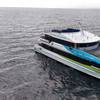Company experts at Centek Industries' headquarters in Thomasville, Ga., frequently receive questions about the design, engineering and manufacturing of custom marine exhaust systems. Here are three of the questions asked most frequently, along with answers from Centek.
1. How do I make my boat quieter?
This one is right in our wheel house. There are several options available when it comes to sound attenuation for both propulsion and generator engines. Centek assigns a rating to their standard exhaust products with the range going from Good to Better to Best. Generally speaking, and compared to straight exhaust, the Good rated muffler provides 15-18 dB of attenuation, a Better rated muffler gives a 22-28 dB improvement and a Best provides an improvement of 25-30 dB. These are ball park estimates and should be used as a rule of thumb. Also available are custom systems which can provide even better results depending on your specific engine and space available. For generator exhaust, these same standard mufflers and ratings are used but at the same time there are other considerations to take into account. Is the noise you are hearing actually the engine running or is it the irritating splash you hear as the exhaust cooling water is discharged overboard? If the overboard discharge is the culprit, consider adding a Gen-Sep and separate the cooling water from the exhaust gasses. The exhaust gas is then discharged to the atmosphere and the cooling water is discharged below the water line thus elimination the splash you hear when the gen-set is running.
2. I am doing a re-power - can I use the same exhaust?
This is usually one of the first questions asked when it comes to a re-power for both propulsion engines and for generator upgrades / changes. The short answer is maybe. To get the most from your new engine or gen-set, it is important to make sure that the exhaust system is properly sized. A properly sized exhaust system provides the best sound attenuation and stays within the backpressure limits set by the engine manufacturer. When Centek engineers recommend a specific size, they take into account a number of variables which include, but are not limited to, horsepower, raw water flow, exhaust flow and temperatures, the position of components relative to the waterline and the backpressure limits. If you have a question whether or not your current system will work, call and talk with a Centek engineer and let them help guide you through the process. Also, keep in mind that Centek can supply an almost endless variety of elbows and fittings for your new project.
3. I have a leaking muffler. How can I fix it?
Often customers call in with questions about mufflers or other exhaust components that have developed a leak. In addition to looking for dripping water on the muffler body or water in the area of the muffler, another sign to look for is salt deposits on the muffler. These salt deposits appear as a white chalky substance and indicate a “weeping” spot where water is escaping. Before any consideration of a repair or replacement, first determine why the leak occurred. Almost 100% of the time, this type of leak indicates that the muffler experienced overheating due to a loss of cooling water in the exhaust stream. If the cause of overheating is not corrected, any repair is going to be short lived. Centek uses high temperature resins in all our products; however, if cooling water is interrupted, exhaust temperatures can sky rocket quickly. When temperatures reach a certain point, the resin is essentially baked out of the resin/glass matrix causing water droplets to seep from the damaged area.
When a muffler or other exhaust component develops a leak, the best course of action is to replace the item. A good fiberglass shop can patch a leak on a temporary basis but replacement is critical. Keep in mind, when cooling water is lost and temperatures spike, damage can occur to the internals of the muffler or component which is often impossible see.














